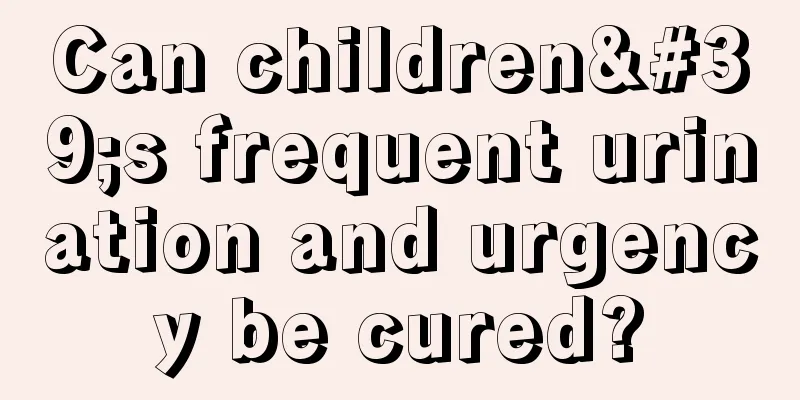Can children's frequent urination and urgency be cured?

|
Some parents report that their children always urinate a lot, especially at night, and often have to get up several times in the middle of the night. What is going on? Neurogenic urinary frequency in children is a common disease in pediatric outpatient clinics, with the only clinical manifestation being the frequent urge to urinate when the child is awake. That is, the child's daily urination frequency increases, but the urine volume does not increase significantly. Now let me tell you in detail what to do if your child has frequent and urgent urination. Generally, frequent urination will be significantly aggravated before going to bed, during meals, and during classes. The symptoms of frequent urination disappear after the child falls asleep, and he usually does not wet the bed. I went to the hospital for a routine urine test and all the results were normal, indicating non-infectious frequent urination. Mental stress, environmental changes Easy to become a trigger Children with neurogenic urinary frequency do not actually have any organic lesions. There are two main reasons for frequent urination: internal and external. The internal reason is that the cerebral cortex of children is not yet fully developed, and the inhibitory function of the primary urination center of the spinal cord is poor, which makes it easy to be affected by adverse external stimuli and have urination dysfunction. External factors may be some negative influences in the child’s recent life, which have caused the child to be nervous or have formed adverse stimulation to his or her mental state, such as changes in living environment, lack of psychological preparation like just entering kindergarten or school, or the sudden separation of parents or the death of relatives. In addition, it may also be due to fear of exams or fear of certain animals, etc., which may increase the child's mental tension, cause anxiety, and cause the function of inhibiting urination to be impaired. As a result, the child will show frequent urge to urinate and increase the frequency of urination. Psychological adjustment is enough Use medication with caution If you find that your child has frequent urination, you should first take him to the hospital for examination to rule out the possibility of any disease. Since neurogenic urinary frequency is a non-infectious type of urinary frequency and urgency, and urinary tract infection in children is an infectious disease and can also manifest as frequent urination and urgency, a routine urine test at the hospital can provide a clear diagnosis. Urine tests for urinary tract infections in children will be abnormal, showing turbid urine mainly composed of white blood cells. Children will generally also have other symptoms of discomfort, such as fever, crying, irritability, etc. An experienced pediatrician can usually tell the difference. Once it is confirmed to be neurogenic frequent urination, parents do not need to be too nervous. First, they should analyze the child's recent living conditions, find out the reasons that cause the child's nervousness and anxiety, explain and comfort the child carefully, so that the child has a correct understanding of the things he is afraid of and worried about, and return to his previous relaxed and happy mood as soon as possible. In this way, frequent urination will be corrected naturally. Some drugs, such as 654-2 and oryzanol, help regulate nerves, relax the detrusor muscle of the bladder, contract the sphincter, increase the bladder's urine storage capacity, and reduce the frequency of urination. They can be used under the guidance of a doctor when necessary. In addition, you can try boiling 15 grams of corn silk in water and adding appropriate amount of sugar to drink instead of tea. Generally, most children around three years old can be relieved after emotional regulation, and drug treatment is not recommended. What is frequent urination? A normal child may urinate 6-8 times a day, while a child with neurogenic frequent urination may urinate 20-30 times a day, or even 40-50 times a day, up to more than ten times an hour. However, the amount of urine excreted each time is not much, sometimes only a few drops, and the symptoms of frequent urination will disappear after falling asleep. The child had no other abnormalities except increased frequency of urination when awake, and a routine urine test was also normal. When the child wants to urinate, encourage him to hold it in and extend the interval between urinations. If he makes progress, he should be praised and the interval between urinations should be gradually extended to normal. For children who have just entered kindergarten, the cooperation of kindergarten teachers is required. The teachers should be more understanding and comfort the children. The children should relax during class and participate in more relaxing and enjoyable games to focus their attention on games or other activities. |
<<: How to quickly relieve the pain of tooth decay in children?
>>: What to do if a teenager has a hunchback
Recommend
What medicine should children take for gastrointestinal cold
Gastrointestinal colds are relatively common clin...
What foods are good for children who sweat a lot?
Children who sweat frequently should pay attentio...
What to do if your baby has a low-grade fever and diarrhea
When the baby is a few months old, his body is re...
Reasons why children have a bad taste in their mouth
Some children have an unpleasant smell when they ...
Clinical manifestations of heart failure in children
The situation of heart failure in children is sti...
Treatment of cerebral palsy in children
Cerebral palsy is a very serious disease, and mos...
Newborn baby has a sound in the throat
There are many possible reasons why a newborn'...
The baby eats complementary food and doesn't like to drink milk
Babies can easily feel full after eating compleme...
Can children take anti-inflammatory drugs for toothache?
Toothache is a relatively common phenomenon. Not ...
Red and swollen toes of children
Children may sprain their feet when playing, caus...
How much Lancen oral liquid should children take
Many people use Lanqin oral liquid when they are ...
What to eat for a 3-year-old baby with anemia
Every parent is very confused. Their baby is whit...
What to do if your child has calf muscle pain
Sometimes, children will experience bone pain dur...
How should children practice yoga?
Yoga is a sport that tests a person's flexibi...









